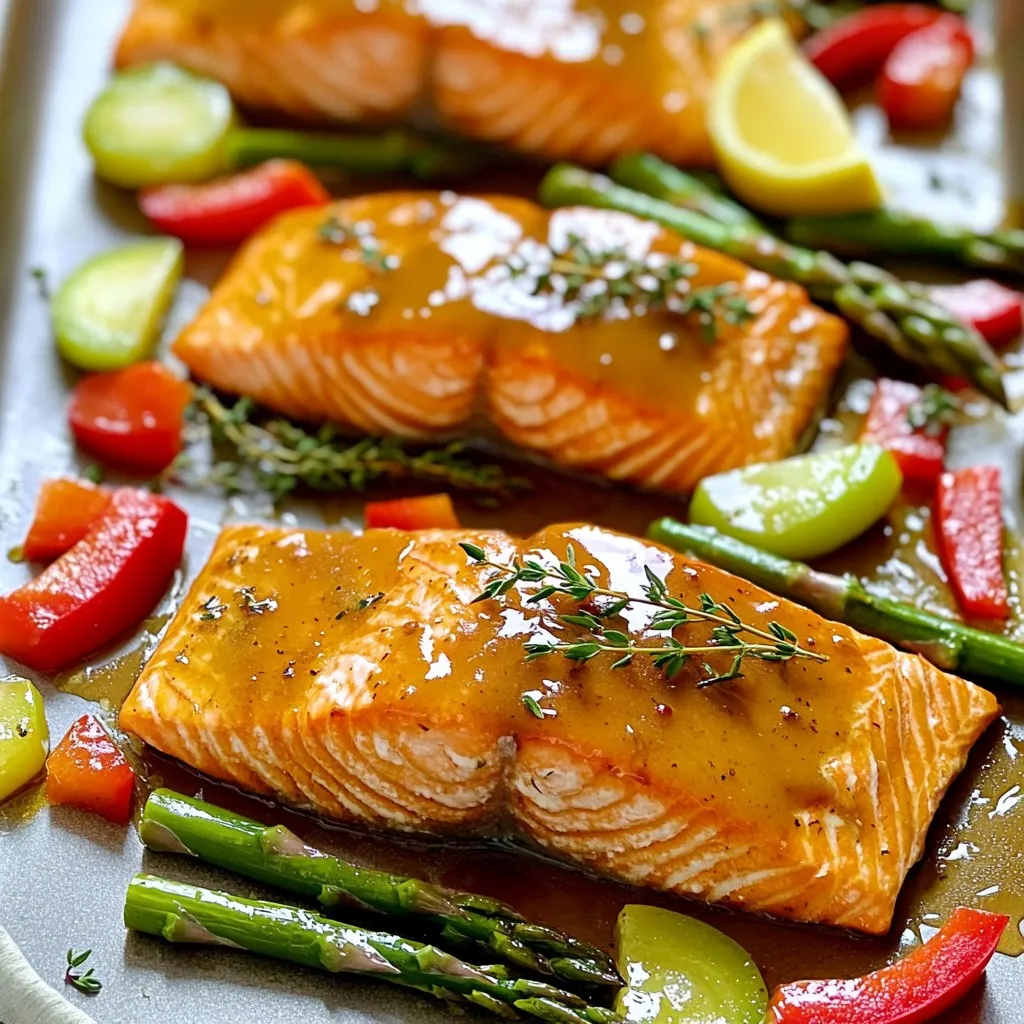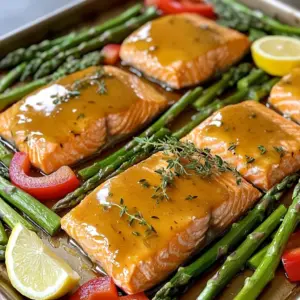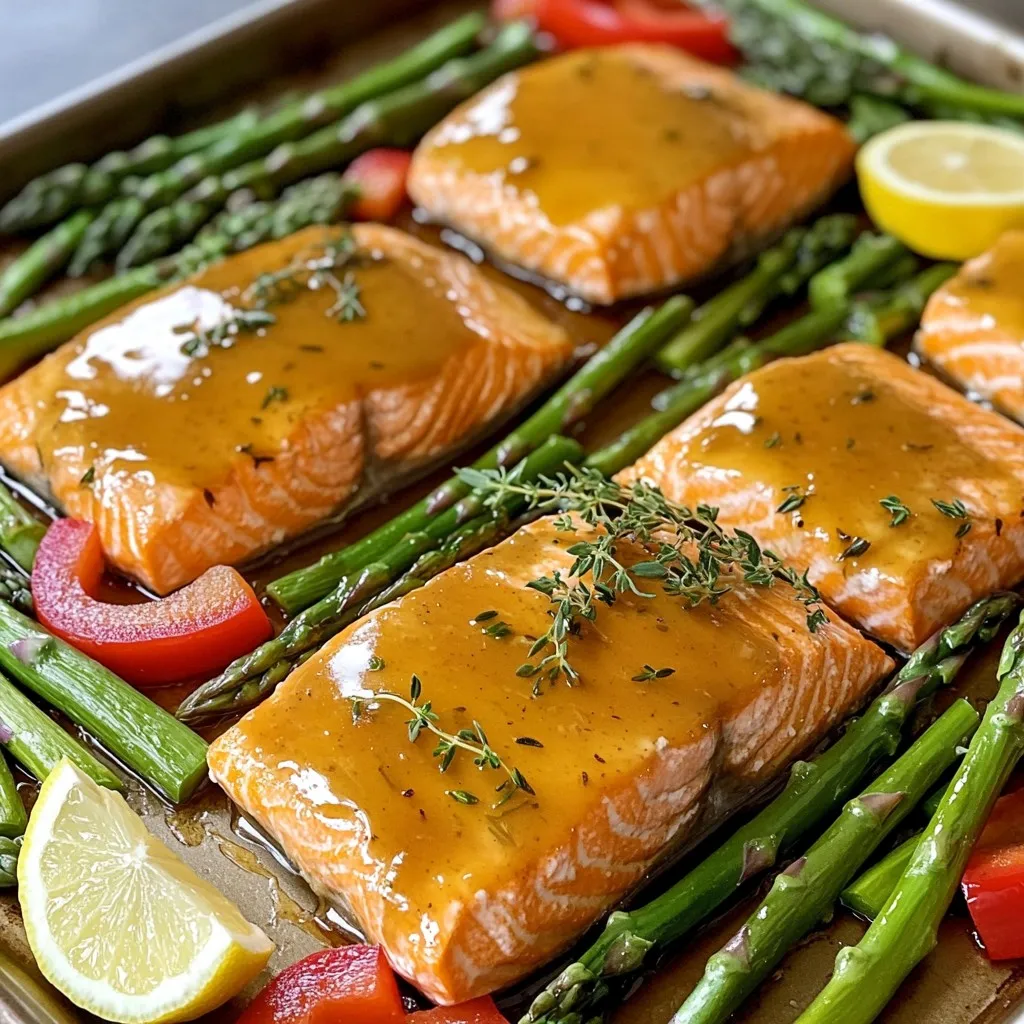Looking for a quick and tasty meal? Try my Maple Dijon Sheet Pan Salmon! This dish is packed with flavor and is super easy to make. With just a few main ingredients like salmon, maple syrup, and Dijon mustard, you can create a healthy dinner in no time. Let’s dive into the steps and tips that will make this sheet pan dinner a hit at your table!
Ingredients
Main Ingredients Needed
– 4 salmon fillets (about 6 ounces each)
– ¼ cup pure maple syrup
– 2 tablespoons Dijon mustard
– 2 tablespoons olive oil
Additional Ingredients
– 3 cloves garlic, minced
– 1 teaspoon soy sauce (or tamari for a gluten-free option)
– 1 teaspoon fresh thyme leaves (or ½ teaspoon dried thyme)
– 1 pound asparagus, trimmed
– 1 red bell pepper, sliced
Seasoning and Garnish
– ½ teaspoon salt
– ¼ teaspoon black pepper
– Lemon wedges for serving
Gathering these ingredients is simple and fun. The salmon fillets are the star of the dish. They bring a rich flavor and healthy fats. Maple syrup gives just the right sweetness. Dijon mustard adds a nice tang to balance the syrup.
You don’t want to skip the garlic. It gives depth to the glaze. Soy sauce adds an umami kick, while thyme brings a fresh herbal touch. The veggies, asparagus and red bell pepper, add color and crunch.
Finally, season with salt and pepper. These make every bite tasty. Lemon wedges are perfect for squeezing on top. They brighten the dish and enhance the flavors.
This list makes it easy to enjoy a great meal!
Step-by-Step Instructions
Preheat and Prepare the Pan
First, set your oven to 400°F (200°C). This hot oven will help cook the salmon perfectly. Next, line a large sheet pan with parchment paper. This step makes cleanup easy and helps prevent sticking.
Make the Maple Dijon Glaze
In a small bowl, combine the following ingredients:
– ¼ cup pure maple syrup
– 2 tablespoons Dijon mustard
– 2 tablespoons olive oil
– 3 cloves garlic, minced
– 1 teaspoon soy sauce (or tamari for a gluten-free option)
– 1 teaspoon fresh thyme leaves (or ½ teaspoon dried thyme)
– ½ teaspoon salt
– ¼ teaspoon black pepper
Whisk these together until smooth. This glaze adds sweet and tangy flavor to your dish.
Arrange Salmon and Vegetables
Place the salmon fillets skin-side down on one side of the lined sheet pan. Brush each fillet with the maple Dijon glaze. Next, take the trimmed asparagus and sliced red bell pepper and arrange them on the other side of the pan. Drizzle these veggies with olive oil and sprinkle with salt and pepper. Toss them gently to coat.
Baking Instructions
Now, place the sheet pan in the preheated oven. Bake for about 15 to 20 minutes. The salmon should flake easily with a fork when done. It should reach an internal temperature of 145°F (63°C).
If you want a bit of char, consider broiling the dish for the last 2 to 3 minutes. Keep a close eye on it to prevent burning. Once it’s done, take it out and let it rest for a few minutes. Serve it with fresh lemon wedges for added brightness.
Tips & Tricks
Perfecting the Glaze
To get the best flavor, mix maple syrup and Dijon mustard well. The sweet and tangy taste makes the dish shine. Use fresh garlic for a bold kick. Adding soy sauce adds depth to the glaze. Brush it on thick for a rich flavor. You can double the glaze if you want more.
Cooking Techniques for Salmon
Check the doneness of salmon by looking for flakiness. It should flake easily when you press it with a fork. The center should be a light pink. Aim for an internal temperature of 145°F. Broiling for a few minutes can caramelize the glaze. It gives a nice, rich color and flavor. Keep an eye on it to avoid burning.
Vegetable Cooking Tips
To ensure your veggies stay crisp, cut them evenly. This helps them cook at the same rate. Toss them in olive oil and season well. Don’t overcrowd the pan; give them some space. This allows hot air to circulate, keeping them firm. If you want extra crunch, add them halfway through cooking.

Variations
Ingredient Swaps
You can change the veggies in this dish for more variety. Try using:
– Broccoli florets
– Green beans
– Zucchini slices
– Carrots, sliced thin
These swaps add new colors and flavors. Each option brings its own taste and texture.
Flavor Enhancements
If you want to boost the flavor, consider these options:
– Add a pinch of red pepper flakes for heat.
– Use maple bourbon for a deeper flavor.
– Swap in honey instead of maple syrup for a different sweetness.
– Experiment with fresh herbs like parsley or dill.
These changes can make your meal unique and exciting.
Dietary Adaptations
This recipe fits many diets. For a gluten-free option, use tamari instead of soy sauce.
If you are looking for a low-carb version, skip the maple syrup. You can use a sugar substitute like stevia.
These swaps keep the dish tasty while meeting your dietary needs.
Storage Info
Leftover Storage Guidelines
Store leftovers in an airtight container. Keep them in the fridge. Try to eat them within two days for the best taste. If you have extra glaze, save it too. It adds great flavor when you reheat.
Reheating Tips
To reheat salmon, use the oven for even heat. Preheat the oven to 300°F (150°C). Place the salmon on a baking sheet. Cover it with foil to keep it moist. Heat for about 10-15 minutes. You can also use the microwave. Just cover the salmon and heat in short bursts, checking often.
Freezing Instructions
To freeze salmon, wrap each fillet in plastic wrap. Then, place the wrapped fish in a freezer bag. Remove as much air as possible. Store for up to three months. To thaw, move the salmon to the fridge overnight. This keeps the fish fresh and tasty.
FAQs
How long do I bake salmon in the oven?
Bake salmon at 400°F (200°C) for 15 to 20 minutes. The salmon should flake easily when done. Use a fork to check its texture. For the best taste, aim for an internal temperature of 145°F (63°C).
Can I use other types of fish?
Yes, you can use other fish like trout or cod. These fish have a similar cooking time. They will also soak up the maple Dijon glaze well. Just make sure to adjust the baking time if needed.
What sides pair well with this dish?
Asparagus and red bell pepper go great with this salmon. You can also try roasted potatoes or a fresh salad. Quinoa or brown rice can add a nice grainy texture. For a light touch, consider serving with lemon wedges or a creamy dip.
You now have a complete guide to making a delicious salmon dish. We covered the main ingredients, like salmon, maple syrup, and Dijon mustard. I shared step-by-step instructions and helpful tips for cooking. You learned different variations and storage tips, too.
By following these steps, you can enjoy a tasty meal. Cooking salmon can be simple and fun, so give it a try! Experiment and find your favorite flavors. Happy cooking!

